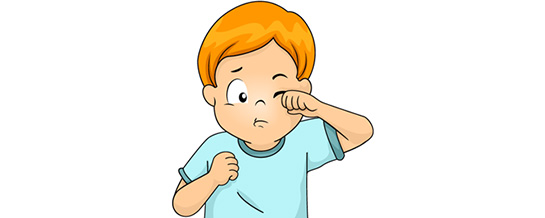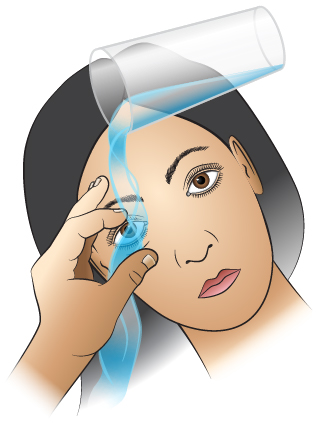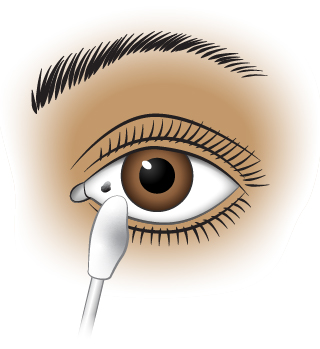Disclaimer [ENGLISH]
Disclaimer: This material is for educational purposes only. You, the reader, assume full responsibility for how you choose to use it. It is not intended to provide medical advice, diagnosis or treatment, nor does it replace the advice or counsel of a doctor or health care professional. Reference to a specific commercial product or service does not imply endorsement or recommendation of that product or service by CPCMG.
What is an eye foreign body?

- An object gets stuck in the eye that is not supposed to be there.
- Most common examples: make-up, dust, an eyelash, stuck contact lens, dirt.
- The object is trapped, it cannot go behind the eye.
- Usually, it can be easily removed without harming the eye.
What are the symptoms of an eye foreign body?

- Your child may tell you they feel like there is something stuck in their eye.
- They may tell you their eye hurts.
- They may complain that light bothers their eyes.
- Their eye may look red, irritated, or feel itchy.
- You may notice them rubbing their eye a lot.
- They may start blinking more than normal.
- The eye may water a lot.
What is the treatment for an eye foreign body?
- You can try flushing the eye with warm water or saline (available over the counter).

- You can try gently removing it with a cotton tip applicator.

- In the office, your child’s primary care provider will examine the eye.
- Your child’s eye may need flushing or removal of the object with special equipment.
- Your child’s eye may need to be checked for a scratch on the cornea (a specific part of your child’s eye).
- To do this, your child’s primary care provider will place drops in the eye and then shine a light on it to check for scratches.
- Your child may need eye ointment.
- Your child’s primary care provider may need to refer to an eye specialist for further care.
- If your child wears, contact lenses they will need to switch to glasses until the eye is healed.
How do I prevent my child from getting a foreign body in their eye?

- Encourage lots of hand washing.
- Avoid touching the eyes unless necessary. Talk with your child about the importance of not putting anything in their eyes.
- Use eye protection (like glasses or goggles) for all contact sports or activities where they are more likely to get something in their eye.
- Avoid toys with sharp edges that could hurt your child’s eyes until your child is old enough to understand.
- Follow all guidance for use and care of contact lenses.
- Wash your child’s eyes/face or have them take a bath or shower after playing in an environment with a lot of dust or dirt.
When to contact your child’s healthcare team:
- You think your child needs to be seen.
- You cannot get the object out of your child’s eye.
- Your child is complaining of eye pain.
- Your child tells you things look funny, or they are having trouble seeing.
- Your child complains that lights hurt their eye.
- Your child tells you they stuck something in their eye or scratched their eye.
- You notice your child’s eye is constantly tearing or watery.
- The whites of your child’s eyes continue to look red.
- Your child’s symptoms are getting worse.
This publication was adapted from information within American Academy of Pediatrics Patient Education Handouts, UpToDate Guidelines and Healthychildren.org
Reviewed by: TT D.O, AR D.O. | 04/2024


